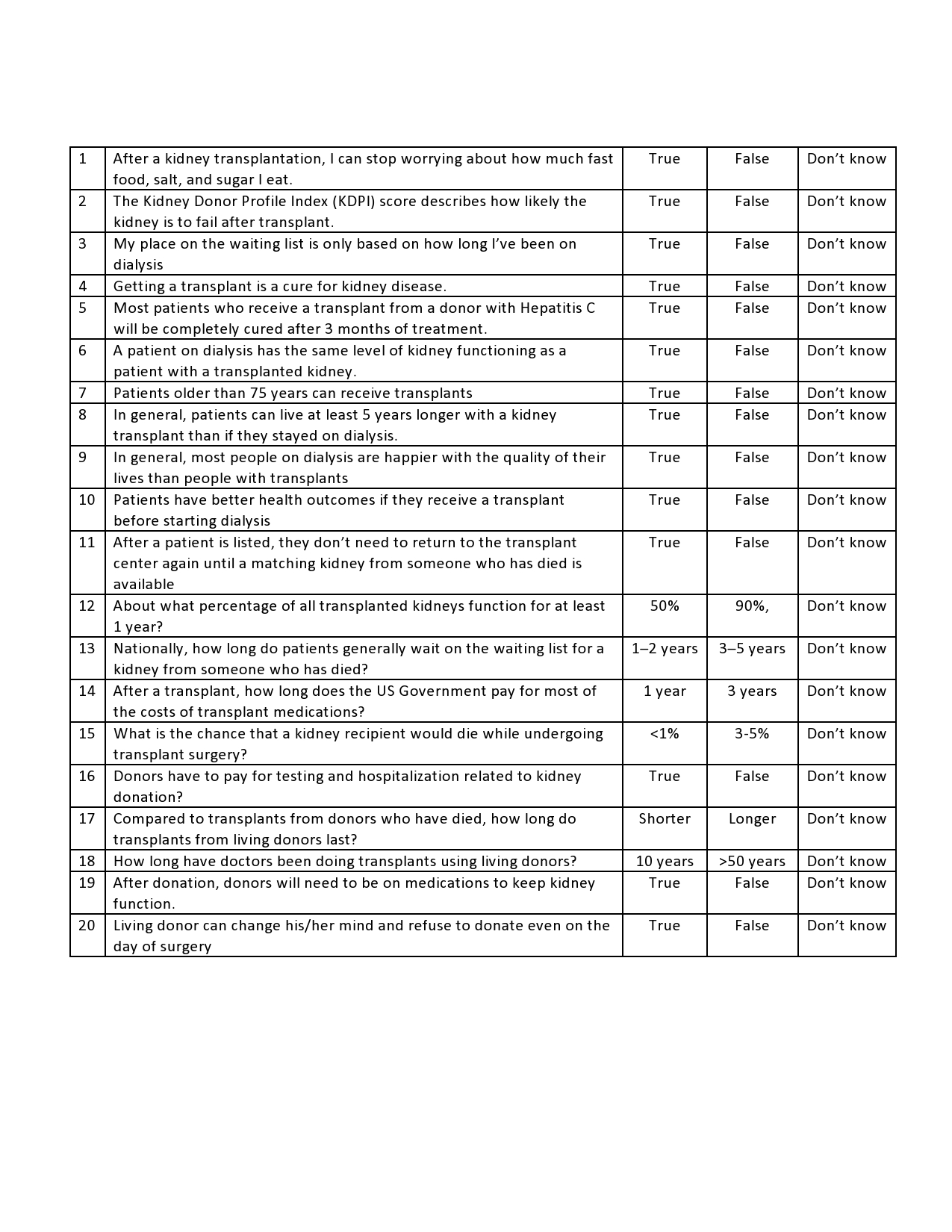Understanding Transplant Awareness in Pre-Kidney Transplant Recipients – Role of Surgeon Visit
Tulane University School of Medicine, New Orleans, LA
Meeting: 2022 American Transplant Congress
Abstract number: 620
Keywords: Donation, Kidney transplantation, Patient education, Resource utilization
Topic: Administrative » Administrative » 01 - Quality Assurance Process Improvement & Regulatory Issues
Session Information
Session Name: Quality Assurance Process Improvement & Regulatory Issues
Session Type: Poster Abstract
Date: Saturday, June 4, 2022
Session Time: 5:30pm-7:00pm
 Presentation Time: 5:30pm-7:00pm
Presentation Time: 5:30pm-7:00pm
Location: Hynes Halls C & D
*Purpose: Education for pre-Kidney Transplant recipient candidates aims to improve their knowledge and understanding about the transplant process, outcomes and potential complications and facilitate adjustment to post-transplant life. The timing, type of educational interventions and personnel providing it can only be tailored with better understanding of transplant awareness of recipients prior to their transplant evaluation process.
*Methods: We surveyed all patients who attended an initial clinic visit for a kidney transplant evaluation at our transplant institute from Oct 1st to Oct 31st,2021. Patients were seen, evaluated and educated by a transplant surgeon. A 20-item knowledge-based survey was distributed before and after the surgeon visit. Respondents had the ability to choose “Do not know” as an option, in addition to “Yes” or “No” as the other two answer choices provided. Patient survey scores were analyzed before and after clinic visit and in relation to the time spent by surgeon with patient during clinic visit.
*Results: A total of 41 candidates were surveyed in the study period. Before the initial clinic visit, the mean percentage of correct answers was 39.98%, incorrect was 16.69%, and “Do not know” responses were 43.44%. Following the initial clinic visit, these percentages were 58.52%, 17.81%, and 23.67%, respectively. 34 out of 41 patients (82.9%) demonstrated improvement in tested patient knowledge. The increase in percentage correct and the decrease in percentage of “Do not know” responses were statistically significant (both p< .001). Surgeons spent an average of 26 minutes with each patient. There was no statistically significant correlation between the surgeon visit time and improvements in knowledge post visit.
*Conclusions: Our results show that patient education during the initial kidney transplant evaluation visit is crucial for the improvement of patient knowledge, especially in the clarification of previously unknown information. However, longer initial clinic visits are not necessarily associated with increasing returns in patient education. Incorporating other delivery methods of educational intervention such as videos, online resources may help accentuate the transplant awareness gained during their first clinic visit.
To cite this abstract in AMA style:
Defelice G, Harrington H, Ratcliff M, Moravec D, Wands E, Sauviac A, Paramesh A, Vijay A. Understanding Transplant Awareness in Pre-Kidney Transplant Recipients – Role of Surgeon Visit [abstract]. Am J Transplant. 2022; 22 (suppl 3). https://atcmeetingabstracts.com/abstract/understanding-transplant-awareness-in-pre-kidney-transplant-recipients-role-of-surgeon-visit/. Accessed February 26, 2026.« Back to 2022 American Transplant Congress

